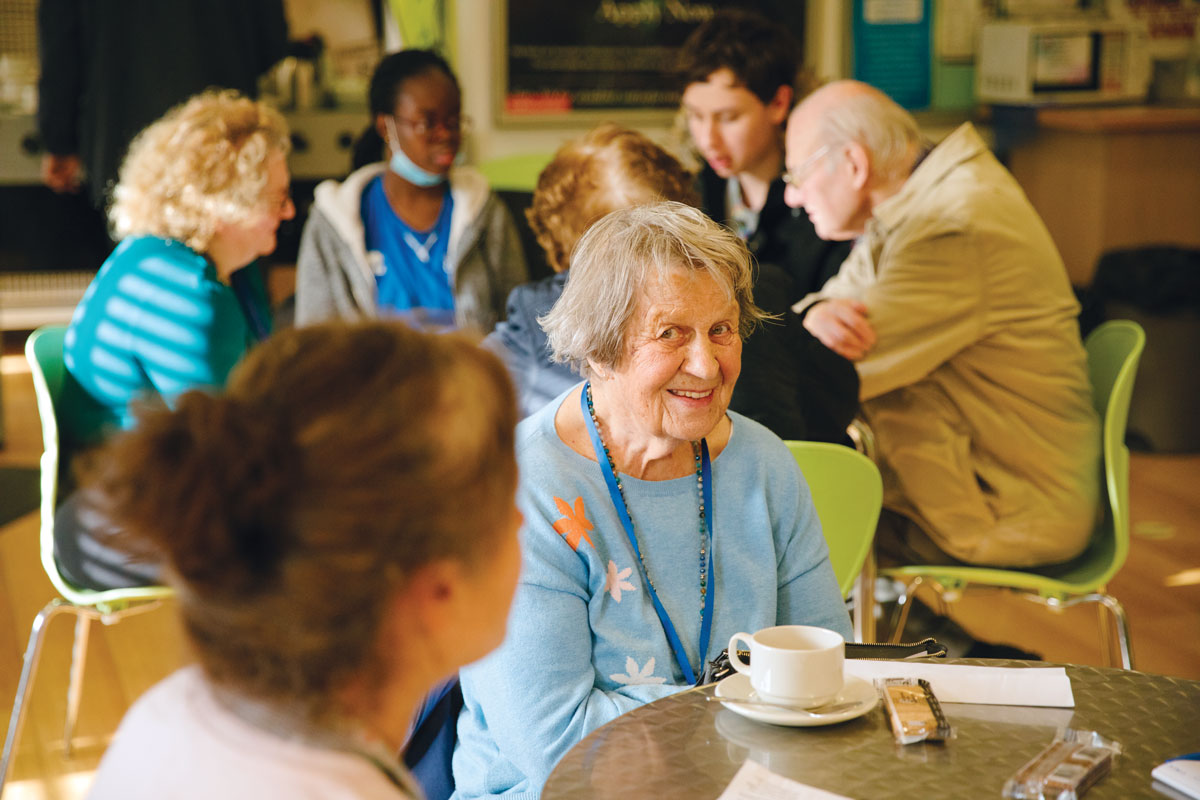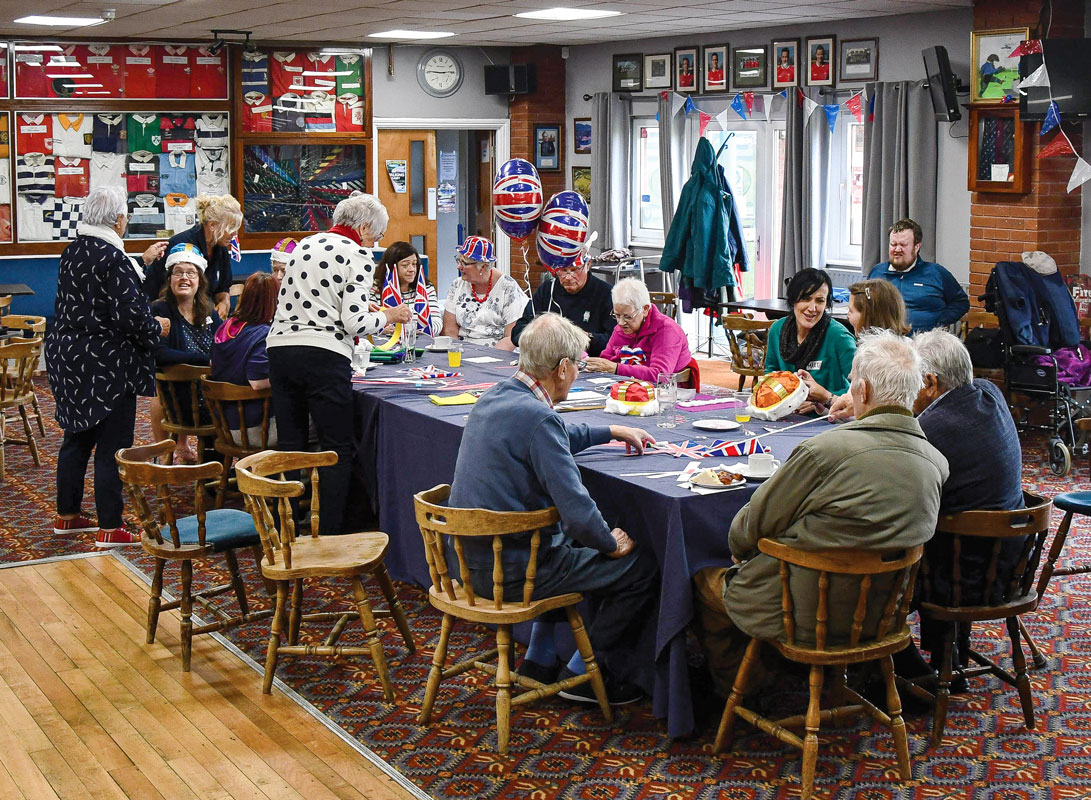Connection is a cure Rotary clubs, experts and governments are tackling loneliness with meaningful interactions.

F or Vera Cranmer and Sylvia Worden, two friends in their 80s, it’s hard to overstate how much they look forward to their regular visits with the teenage students at a local college on England’s south coast. “We savour these visits like reunions with long-lost friends,” Sylvia says.
The women live independently in their homes in Chichester, a picturesque and vibrant cathedral city near the sea. But Sylvia, who once worked as a teacher there, was widowed a few years ago, and her outings in town are far less frequent. Vera, too, has had to cope with feelings of isolation.
Today, though, the two women are among a dozen elders, as they call themselves, having a lively discussion about the royal family with the students at Chichester College. “I really enjoy the discussions with the young people. Some of them are so aspirational,” says Sylvia. “I am probably one of the younger elders there, but I’ve made good friends with a lady who is 92. It’s a great outlet for a lot of the older residents.”
Vera, 88, agrees. “Sometimes I’m not sure if I want to go out, but when I come back home, I feel I’ve had a good morning. It’s nice to meet other people like myself, but it’s really nice to meet the youngsters, to see a different side and come back feeling positive.” She once worked as an occupational therapist, specialising in caring for people with cerebral palsy. These days, she has difficulty walking and depends on the on-demand minibus transport to get to the college. “I couldn’t manage without it,” she says.
Bridging Generations, a project organised by RC Chichester Priory, is tackling loneliness by connecting college students with older people. Every two weeks, a group of elders has coffee, cake, and a chat with students in the college canteen. Afterward, many elders stay for lunch cooked by catering students. The Rotary club pays for transport, while Chichester College provides the space and refreshments.
The costs are minimal, but the rewards plentiful. A 2018 report by the nonprofit organisations Generations United and the Eisner Foundation indicated that intergenerational programmes are particularly effective in fostering wellbeing. Among adults who participated in one such programme, 97 per cent reported that they benefited from the programme, with the vast majority saying they felt happy, loved and needed.
What has come across more than anything is the shared laughter and camaraderie, the feeling of being valued, listened to, and that you matter.
There are benefits for younger people too. For instance, Chichester College has invited students from across campus to take part in the Bridging Generations meetings, and the project has proved a valuable tool to build students’ communication and interpersonal skills. “What has come across more than anything is the shared laughter and camaraderie, the feeling of being valued, listened to, and that you matter, whether you are 17 or 92 years old,” says Rae Benn, who until recently helped facilitate the programme for the college.
Bridging Generations was the brainchild of Rotarian Mike Harvey, who approached Chichester College in 2013 with the idea. He recognises alleviating loneliness and isolation as a significant community challenge. The quest starts with identifying those who are on their own a lot of the time and willing to reach out and seek connection.
Harvey, a member of the Chichester Priory club, found participants by talking to community organisations such as Age UK and Health and Independent Living Support, which provides meals on wheels. “Others came to us through church leaders, sheltered housing, and our own contacts,” he says. “When it all comes together, seeing lonely people having good times, talking to students two or three generations below them, is so stimulating.”
Exacerbated by the Covid pandemic seclusion, loneliness has become a global public health crisis. In the US, even before the pandemic, a quarter of Americans aged 65 and older described themselves as socially isolated, including 4 per cent, or 1.3 million people, experiencing severe social isolation, according to a 2011 study. And loneliness doesn’t just affect older people. In Britain, 5 per cent of adults, or 2.6 million people, said in a government survey that they felt lonely “often” or “always” during a month in the pandemic’s early days in 2020.
Such is the concern in the UK that in 2018 the government appointed a minister for loneliness as part of a “Tackling Loneliness” strategy that has invested more than £50 million (about $59 million) to work with a range of charitable partners.
Studies in Europe and the US link chronic loneliness to poor physical health and an increased risk of dementia, coronary heart disease and stroke. Researchers have likened loneliness to high blood pressure or smoking 15 cigarettes daily as a risk factor for premature death. A well-known Harvard University study that tracked 724 people over their entire adult lives clearly determined social relationships as the best predictor of a person’s long-term physical and emotional wellbeing. The connection between poor physical health and loneliness is so evident that doctors in many countries have adopted “social prescribing” by routinely screening their patients for loneliness and directing them to activities within their communities.

Women are often found to report significantly more loneliness than men, though some researchers caution that the gender difference might be due to men being more reluctant to report undesirable feelings such as loneliness. Additional risk factors for loneliness include mental illness and poor physical health.
In June 2022, the UK government published further research that demonstrated how mental health distress can play a significant role in the onset and continuation of chronic loneliness. The report also suggests a solution: targeted early intervention. “People experiencing chronic loneliness were shown in our study to be nearly four times more likely than people without chronic loneliness to be in mental distress,” explains Sokratis Dinos, co-director of health and social care at the London-based National Centre for Social Research. “Poor mental health can lead to difficulties connecting with others, social withdrawal and loneliness, while loneliness can equally contribute to poor mental health.”
Ministers in the British government came together to draw up a revised strategic plan for targeted intervention to be published early this year, supported by £750 million (about $895 million) for a charity funding package.
Since Rotary’s founding purpose is for people from different backgrounds to exchange ideas and form meaningful, lifelong friendships, Rotary clubs are a natural antidote for loneliness. They offer connections plus closer engagement with the wider community. Researchers suggest that the quality of relationships, not the quantity, matters most. Rotary provides a sense of purpose and meaning, accompanied by the personal payback of greater self-worth.
At the beginning of the Covid pandemic, when in-person meetings were curtailed, Rotary members kept connecting with older and disabled people through phone calls, running errands for them, picking up prescriptions, and even walking their dogs.
Lisa Hunter, a member of the Rotary Club of Maidenhead Bridge, received a British Empire Medal in the Queen’s 2022 New Year Honours List for mobilising her club’s response to families in need during the pandemic. “Through the Rotary network, we come together to use our skills and knowledge to support each other and build up our communities,” she says. “Nowhere was this more apparent to me than at the beginning of the pandemic when our community went into lockdown and people were isolated and shut-in. My club formed a community response team to mobilise a network of volunteers to do what we do best: support those who need help in difficult times.”
With a pool of 120 volunteers, including non-Rotary members, the club supported more than 150 households, performing more than 3,800 errands, which equated to about 6,500 volunteer hours.
Worldwide, Rotary clubs have always worked within their communities to reach out to those who feel isolated. For instance, Rotary clubs run or otherwise support dozens of Memory Cafes across the UK. They are focal points for people with early-onset dementia as well as their caregivers to meet, play games, chat, watch films and sing. Originally developed in the Netherlands in the 1990s, the concept was introduced to Rotary International in Great Britain and Ireland (RIBI) in 2008 by Tim Jones, a member of the Rotary Club of Wadebridge.
“At the time, I was working for the National Health Service managing mental health services in Cornwall,” Jones says. He heard about a Memory Cafe in nearby Launceston, thought he should find out more, and subsequently set up the first Rotary-run Memory Cafe in Wadebridge.
The event was so successful that Jones has since helped other Rotary clubs organise Memory Cafes in their communities. “We try to create a comfortable, failure-free environment,” says Geri Parlby, a member of the Rotary Club of Ware. She has been heavily involved in supporting a Memory Cafe in Tavistock in southwest England, and spreading the growth of these meetups. “The idea of Memory Cafes is to offer peer support. It’s a simple philosophy about leaving people with a positive experience, bringing people together to support one another.”
Now retired from the National Health Service, Jones has been conducting his own research into the benefits of Memory Cafes. Though he has not yet published his findings, he sees evidence that socialising and engaging with others creates beneficial changes in the brain. For those with memory loss, this approach aligns with the goals of cognitive stimulation therapy.
“It is about creating positive engagement which focuses on strengths rather than weakness,” Jones says. “Psychologists found that cognitive stimulation therapy and psychosocial engagement can be as effective as the medication given to people in the early stages of Alzheimer’s disease and can slow down brain deterioration.”
Jones is careful not to suggest that social engagement can stop dementia. “There is no cure for Alzheimer’s disease,” he says. “But what we can do is build resilience, which evidence shows can slow down the progress of Alzheimer’s and support people with other dementias. Memory Cafes are wonderful examples of sanctuaries to tackle loneliness, not just among people with dementia, but for their carers as well.”
Taking care of the caregivers is an often-overlooked challenge. Another consequence of the pandemic is an increase in the number of people who are caring for a partner, family member, or friend because of illness.
The London nonprofit Carers UK estimates there are now more than 10 million unpaid caregivers in the United Kingdom. They range from young adults to retirees. Since 2020, RIBI has partnered with Carers UK to highlight the issue. Carers UK offers a telephone helpline, regular online meetups, and an online forum where caregivers can connect to provide mutual support.
Cheryle Berry, a member of the Rotary Club of Clay Cross, serves as one of the partnership leads. “Caring is often a very lonely situation, and carers can feel isolated and overwhelmed,” she says.
More than 100 Rotary club ambassadors and district leads have connected thousands of caregivers in their communities to the free services provided by Carers UK, according to Berry. “Rotarians regularly arrange online and face-to-face meetings of unpaid carers for friendship and support, including respite opportunities, Rotary friendship cafes, and activity groups across the UK,” Berry explains.
In August 2022, RIBI launched the Rotary Million Unpaid Carers campaign with a goal to reach one million caregivers with support and advice by the end of the 2022–23 Rotary year.
Pictures by Serena Brown
Reproduced from Rotary
